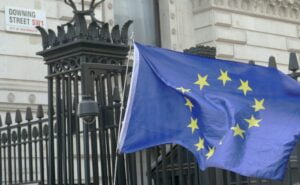EU UK discuss N. Ireland post-Brexit trading problems. In this article, you’ll read about the ongoing discussions between the European Union (EU) and the United Kingdom (UK) regarding the post-Brexit trading problems in Northern Ireland. UK Foreign Secretary James Cleverly recently met with EU Commission Vice-President Maros Sefcovic to address the concerns and tensions surrounding the new Northern Irish trade arrangements. The UK and the EU have been working together to find joint solutions and ensure the protection of the Belfast Agreement while safeguarding the EU Single Market and the UK internal market.
Despite previous strains in EU-UK relations, the talks were described as cordial and constructive, with an agreement reached on the EU’s access to UK IT systems. Technical teams will now focus on identifying solutions, and further discussions are scheduled for January 16. The implementation of the Northern Ireland Protocol, which kept Northern Ireland in the European single market and customs union, has been a point of disagreement between the EU, Ireland, and the UK. The protocol’s provisions have led to tensions and boycotts, but efforts are being made to find a way forward and address the concerns of businesses and communities in Northern Ireland. https://mauragemsandjewellery.org/department-of-international-trade-promotion/
EU UK discuss N. Ireland post-Brexit trading problems

Introduction
In an effort to address the ongoing trading problems in Northern Ireland resulting from Brexit, UK Foreign Secretary James Cleverly met with EU Commission Vice-President Maros Sefcovic. The negotiations between the UK and EU aim to find joint solutions to the concerns raised by businesses and communities in Northern Ireland. This joint statement signifies a shared commitment to protect the Belfast (Good Friday) Agreement while ensuring the integrity of both the EU Single Market and the UK internal market. https://www.theguardian.com/politics/eu-referendum
Background of N. Ireland’s trade arrangements
Since the implementation of the Northern Ireland Protocol, which was signed separately from the trade deal between the UK and EU, tensions have arisen due to the differentiated treatment of Northern Ireland in trade arrangements. To prevent a hard border between Ireland and Northern Ireland, the protocol keeps Northern Ireland in the European single market and customs union, meaning there are checks on goods moving from the rest of the UK to Northern Ireland. While this arrangement was meant to maintain peace in the region, it has sparked disagreements and concerns among some pro-UK unionists, leading to a boycott of the devolved assembly in Belfast.
The meeting between UK Foreign Secretary and EU Commission Vice-President
During the meeting between UK Foreign Secretary James Cleverly and EU Commission Vice-President Maros Sefcovic, both parties took stock of the work being done to find joint solutions. The tone of the talks was described as cordial and constructive, indicating a positive step forward in the negotiations. They addressed critical issues that need to be resolved and reached an agreement on the EU’s access to UK IT systems.
A shared commitment to protect the Belfast Agreement
Both the UK and EU reaffirmed their commitment to protecting the Belfast Agreement, also known as the Good Friday Agreement. This agreement, which was instrumental in ending three decades of conflict in Northern Ireland, is a crucial part of maintaining peace and stability in the region. By emphasizing their commitment to safeguarding this agreement, both parties aim to find a way forward that addresses the concerns of all stakeholders involved.

Strained EU-UK relations under Boris Johnson
During former British Prime Minister Boris Johnson’s tenure, relations between the EU and UK became strained. Johnson introduced legislation to unilaterally overhaul the Northern Ireland Protocol, creating further tensions. However, since Rishi Sunak assumed the role of Prime Minister in October, a more positive diplomatic tone has been observed. This shift in leadership has opened up opportunities for improved relations and constructive negotiations between the UK and EU.
Improved diplomacy under Rishi Sunak
Since Rishi Sunak became Prime Minister, diplomatic relations between the UK and EU have shown signs of improvement. The talks between UK Foreign Secretary James Cleverly and EU Commission Vice-President Maros Sefcovic were described as cordial and constructive, reflecting the positive changes in diplomatic approaches. This shift in tone provides hope for finding mutually beneficial solutions to the trading problems in Northern Ireland.

Agreement on EU’s access to UK IT systems
During the meeting, an agreement was reached regarding the EU’s access to UK IT systems. Both parties recognized the importance of this access as a critical prerequisite to building trust between the UK and EU. Resolving this issue provides a new basis for discussions and cooperation between the two parties. With this agreement in place, technical teams from the EU and UK can begin working on identifying solutions in various areas.
Work of EU and UK technical teams
Following the agreement on the EU’s access to UK IT systems, technical teams from both parties will collaborate to identify solutions to the challenges posed by the Northern Ireland trading arrangements. This renewed understanding and cooperative effort will pave the way for addressing critical issues and finding joint solutions that benefit all parties involved. By working together, the EU and UK can ensure the smooth functioning of trade in Northern Ireland and uphold the commitments made in the Belfast Agreement.
Upcoming meeting on January 16
To further progress in the negotiations, UK Foreign Secretary James Cleverly and EU Commission Vice-President Maros Sefcovic will meet again on January 16. This upcoming meeting demonstrates the commitment of both parties to continue dialogue and find ways to resolve the trading problems in Northern Ireland. By maintaining communication and engagement, the UK and EU can make significant strides in addressing the concerns and ensuring a prosperous trading environment for Northern Ireland.
Flashpoint disagreements over the Northern Ireland Protocol
The implementation of the Northern Ireland Protocol has been a source of contention between the EU, the UK, and pro-UK unionists. The differentiated treatment of Northern Ireland in trade arrangements has drawn criticism and led to a boycott of the devolved assembly in Belfast. Finding common ground and addressing these flashpoint disagreements is crucial for the stability and prosperity of the region.
Impact on pro-UK unionists
The trading problems resulting from the Northern Ireland Protocol have had a significant impact on pro-UK unionists, including the Democratic Unionist Party (DUP). The differentiated treatment has raised concerns and sparked protests among pro-UK unionists, as they fear that it undermines the integrity of the UK and could disrupt the peace achieved through the Good Friday Agreement. Resolving these trading problems will be essential in addressing the concerns of pro-UK unionists and maintaining their trust in the government.
Deadline for resumption of power-sharing body
In the coming weeks, a deadline approaches for the resumption of the power-sharing body in Northern Ireland. If the unions stay away from this resumption, the government in London has warned of calling fresh elections. The resumption of the power-sharing body is crucial for the effective governance of Northern Ireland and for ensuring the representation of all stakeholders. Finding solutions to the trading problems and addressing the concerns of pro-UK unionists will be vital in encouraging the resumption of the power-sharing body.
Warning of fresh elections if unions stay away
To ensure the resumption of the power-sharing body, unions are encouraged to participate. The government in London has issued a warning to call fresh elections if the unions choose to stay away. Fresh elections would provide an opportunity to address the challenges and concerns surrounding the Northern Ireland Protocol. However, meaningful dialogue and cooperation between all parties involved will be essential to avoid the need for fresh elections and ensure the effective governance of Northern Ireland.
In conclusion, the discussions between the UK and EU regarding the post-Brexit trading problems in Northern Ireland signify a positive step forward in finding joint solutions. The shared commitment to protecting the Belfast Agreement and the improved diplomacy under Rishi Sunak’s leadership provides hope for addressing the concerns of all stakeholders involved.
The agreement on the EU’s access to UK IT systems and the collaborative effort of technical teams highlight the willingness of both parties to work together. The upcoming meeting on January 16 demonstrates a continued engagement and commitment to resolving the trading problems. By addressing flashpoint disagreements and considering the impact on pro-UK unionists, the UK and EU can ensure a prosperous future for Northern Ireland. The resumption of the power-sharing body and the avoidance of fresh elections will require meaningful dialogue and cooperation from all parties involved.
